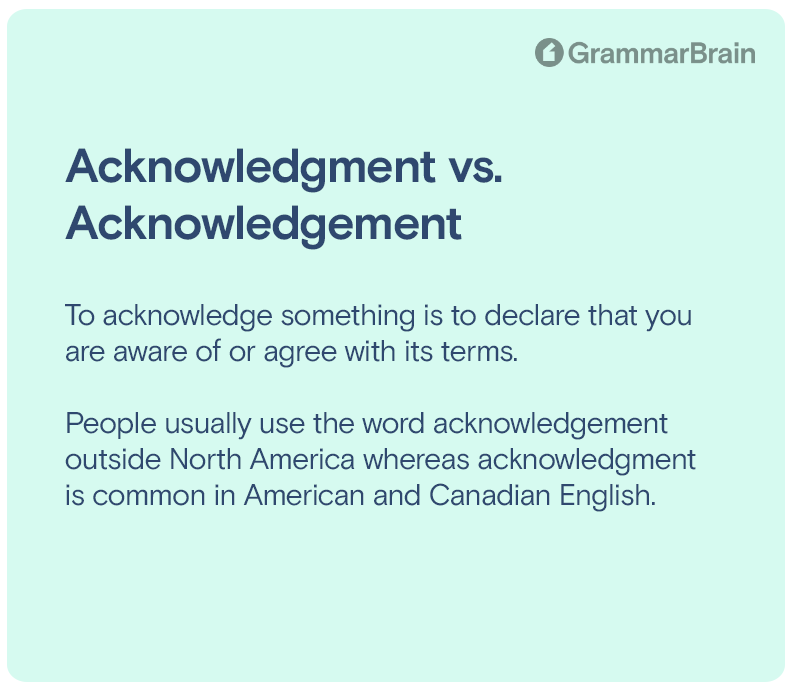Both acknowledgment and acknowledgement are widely used in the English-speaking world. It is quite normal to become confused about which one to use in your content. In this article, you”ll find the meaning of the word acknowledgment, discussion on acknowledgment vs acknowledgement, and some example sentences.

Differences between acknowledgement and acknowledgment
To acknowledge something is to declare that you are aware of or agree with its terms. Although acknowledgment is currently American spelling, it was once preferred in all English dialects. It’s not necessarily older because documents dating back to the 16th century when the word first entered the language contain examples of both spellings.
Users normally use this word while admitting fault or disclosing a secret. For example:
- Does he deserve our forgiveness after the acknowledgment of his mistakes in front of everybody?
You can also use the term can to identify someone or something’s existence, point, truth, or quality, as in the following example:
- Debbie’s friends smiled as an acknowledgment of her remark.
A reward or symbol of appreciation is another meaning of acknowledgment. Here are two examples:
- As acknowledgment for her involvement in the study, the students handed the teacher a beautiful painting.
- He doesn’t advertise his voluntary work because he doesn’t seek much acknowledgment.
The final and most common application of the term acknowledgment is receiving confirmation. Below is an example:
- You are the recipient of this letter of acknowledgement.
- This email serves as an acknowledgment for your payment.
The plural form of acknowledgement might be acknowledgment. Since the plural form is only appropriate in specific circumstances, the noun may be countable or uncountable. You can use the terms “acknowledgments” or “a collection of acknowledgments” to refer to a section of an article, book, etc.
- He credited me as the very first person in his book’s acknowledgments.
- At the completion of the conference, I will make special acknowledgments
But acknowledgment is usually an uncountable noun. You may use this form when expressing confirmation for something. For example:
- The customer did not receive payment acknowledgment.
Synonyms of acknowledgment
Here are some synonyms of the word acknowledgment:
- Yielding.
- Self-confession
- Recognition
- Reaction
- Notice
- Mention
- Credit
- Confirmation
- Confession
- Concession
- Commendation
- Citation
- Avowal
- Appreciation
- Admission
- Acceptance
Acknowledgement vs acknowledgment
People usually use the word acknowledgement outside North America whereas acknowledgment is common in American and Canadian English. These preferences include acknowledgements and acknowledgments in the plural.
Example sentences
Here are some example sentences with the word acknowledgment:
- The acknowledgment of that magazine’s potential involvement came to a senate investigation where government officials fielded a barrage of inquiries.
- It may seem strange that the writer thanked that travel agency in the acknowledgments of a book about genomic research.
- After his death, he finally received the acknowledgment he deserved for his social work.
- John passed his friends by without an acknowledgment.
- Why are you still seeking acknowledgment from your classmates?
- I wanted his acknowledgement and attention.
- His parents claim they have yet to get an acknowledgement or a response.
- The bank didn’t even send me an acknowledgement of my application.
- Alice nodded her head a little in acknowledgement.
- The chocolates are a small acknowledgement of your affection and kindness.
Conclusion
Consider using the spelling acknowledgment when using the term in writing that is primarily for US readers. Despite the fact that both spellings are in use, the spelling distinction is significant. Since you now know the difference between the two, you can use it with ease.
Inside this article
Fact checked:
Content is rigorously reviewed by a team of qualified and experienced fact checkers. Fact checkers review articles for factual accuracy, relevance, and timeliness. Learn more.
Core lessons
Glossary
- Abstract Noun
- Accusative Case
- Anecdote
- Antonym
- Active Sentence
- Adverb
- Adjective
- Allegory
- Alliteration
- Adjective Clause
- Adjective Phrase
- Ampersand
- Anastrophe
- Adverbial Clause
- Appositive Phrase
- Clause
- Compound Adjective
- Complex Sentence
- Compound Words
- Compound Predicate
- Common Noun
- Comparative Adjective
- Comparative and Superlative
- Compound Noun
- Compound Subject
- Compound Sentence
- Copular Verb
- Collective Noun
- Colloquialism
- Conciseness
- Consonance
- Conditional
- Concrete Noun
- Conjunction
- Conjugation
- Conditional Sentence
- Comma Splice
- Correlative Conjunction
- Coordinating Conjunction
- Coordinate Adjective
- Cumulative Adjective
- Dative Case
- Determiner
- Declarative Sentence
- Declarative Statement
- Direct Object Pronoun
- Direct Object
- Diction
- Diphthong
- Dangling Modifier
- Demonstrative Pronoun
- Demonstrative Adjective
- Direct Characterization
- Definite Article
- Doublespeak
- False Dilemma Fallacy
- Future Perfect Progressive
- Future Simple
- Future Perfect Continuous
- Future Perfect
- First Conditional
- Irregular Adjective
- Irregular Verb
- Imperative Sentence
- Indefinite Article
- Intransitive Verb
- Introductory Phrase
- Indefinite Pronoun
- Indirect Characterization
- Interrogative Sentence
- Intensive Pronoun
- Inanimate Object
- Indefinite Tense
- Infinitive Phrase
- Interjection
- Intensifier
- Infinitive
- Indicative Mood
- Participle
- Parallelism
- Prepositional Phrase
- Past Simple Tense
- Past Continuous Tense
- Past Perfect Tense
- Past Progressive Tense
- Present Simple Tense
- Present Perfect Tense
- Personal Pronoun
- Personification
- Persuasive Writing
- Parallel Structure
- Phrasal Verb
- Predicate Adjective
- Predicate Nominative
- Phonetic Language
- Plural Noun
- Punctuation
- Punctuation Marks
- Preposition
- Preposition of Place
- Parts of Speech
- Possessive Adjective
- Possessive Determiner
- Possessive Case
- Possessive Noun
- Proper Adjective
- Proper Noun
- Present Participle
- Prefix
- Predicate



